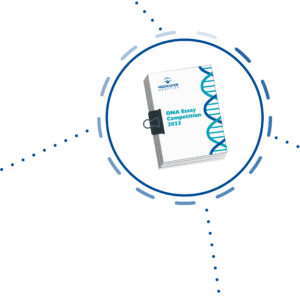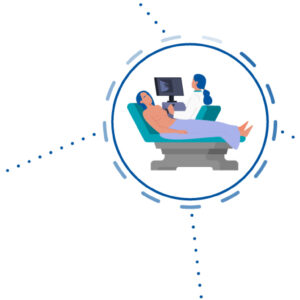Scientific Background
Thyroid cancer is the most common malignancy of the endocrine system and starts from the cells in the thyroid gland. According to WHO, in 2020, thyroid cancer was the 9th most common type of cancer in both men and women worldwide. There are three types of thyroid cancer, differentiated, medullary, and anaplastic. Hereditary conditions such as Multiple endocrine neoplasia type 2 and family history have also been associated with an increased risk of developing different types of thyroid cancer.
PreSENTIA hereditary Thyroid cancer panel tests for numerous germline mutations that could cause thyroid cancers in the future. Identifying germline mutations associated with cancer susceptibility empowers healthcare providers and patients, as it allows them to take better and more informed decisions.
Who is this test for?
You should get tested if you meet at least one of the criteria below:
• You have a personal history of thyroid cancer
• You have a first degree relative with thyroid cancer
• You have a personal or family history of a hereditary cancer syndrome related to thyroid cancer
• You have a family member that has been diagnosed with a germline mutation associated with cancer susceptibility
How many genes are tested in this panel?
1 gene
How many hereditary cancer syndromes are associated with this panel?
1 Hereditary cancer syndrome is associated with this panel. This is:
• Multiple endocrine neoplasia type 2 (RET)
Recommendations by professional bodies
“Germline testing for RET proto-oncogene mutations with genetic counseling by a physician or genetic counselor is recommended for all patients with newly diagnosed medullary thyroid cancer (MTC), including patients with clinically suspected sporadic MTC” (NCCN, 2022)
“If a germline RET mutation is found, then mutation testing should also be done for family members” (NCCN, 2022)
References and more information:
• The above information was taken by professional bodies such as American Cancer Society
• Elisei R, Alevizaki M, Conte-Devolx B, et al.2012 European thyroid association guidelines for genetic testing and its clinical consequences in medullary thyroid cancer. Eur Thyroid J 2013;1:216–231.
• Haddad RI, Bischoff L, Ball D, Bernet V, Blomain E, Busaidy NL, Campbell M, Dickson P, Duh QY, Ehya H, Goldner WS, Guo T, Haymart M, Holt S, Hunt JP, Iagaru A, Kandeel F, Lamonica DM, Mandel S, Markovina S, McIver B, Raeburn CD, • Rezaee R, Ridge JA, Roth MY, Scheri RP, Shah JP, Sipos JA, Sippel R, Sturgeon C, Wang TN, Wirth LJ, Wong RJ, Yeh M, Cassara CJ, Darlow S. Thyroid Carcinoma, Version 2.2022, NCCN Clinical Practice Guidelines in Oncology. J Natl Compr Canc Netw. 2022 Aug;20(8):925-951. doi: 10.6004/jnccn.2022.0040. PMID: 35948029.





















